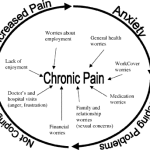According to Web MD, about 100 million Americans suffer from chronic pain which is defined as pain that lasts longer than six months. Chronic pain can be mild or excruciating, episodic or continuous, merely inconvenient or totally incapacitating. This can take both a physical and emotional toll on a person.
Common sources of pain stem from headaches, joint pain, pain from injury, and back aches. Other kinds of chronic pain include tendonitis, sinus pain, carpal tunnel syndrome, and pain affecting specific parts of the body, such as the shoulders, pelvis, and neck. Generalized muscle or nerve pain can also develop into a chronic condition.
The emotional toll of chronic pain also can make pain worse. Anxiety, stress, depression, anger, and fatigue interact in complex ways with chronic pain and may decrease the body’s production of natural painkillers; moreover, such negative feelings may increase the level of substances that amplify sensations of pain, causing a vicious cycle of pain for the person. There is considerable evidence that unrelenting pain can suppress the immune system.
Symptoms of chronic pain include:
- Mild to severe pain that does not go away
- Pain that may be described as shooting, burning, aching, or electrical
- Feeling of discomfort, soreness, tightness, or stiffness
Other problems associated with pain can include:
- Fatigue
- Sleeplessness
- Withdrawal from activity and increased need to rest
- Weakened immune system
- Changes in mood including hopelessness, fear, depression, irritability, anxiety, and stress
- Disability
Chronic pain can be caused by many different factors. Often conditions that accompany normal aging may affect bones and joints that cause chronic pain. Other common causes are nerve damage and injuries that fail to heal properly.
Some kinds of chronic pain have numerous causes. Back pain, for example, may be caused by a single factor, or any combination of the following factors:
- Years of poor posture
- Improper lifting and carrying of heavy objects
- Being overweight
- A congenital condition
- Traumatic injury
- Wearing high heels
- Sleeping on a poor mattress
- Degenerative changes
- No obvious physical cause
Disease can also be the underlying cause of chronic pain. Rheumatoid arthritis, osteoarthritis and fibromyalgia are well-known culprits, but persistent pain may also be due to such ailments as cancer, multiple sclerosis, stomach ulcers, AIDS, and gallbladder disease.
One type of chronic pain is neuropathic pain, which is a complex, chronic pain state that usually is accompanied by tissue injury. With neuropathic pain, the nerve fibers themselves may be damaged, dysfunctional, or injured. These damaged nerve fibers send incorrect signals to other pain centers.
Symptoms of neuropathic pain may include:
Treatments for neuropathic pain include the use of non-steroidal anti-inflammatory drugs, morphine, anticonvulsants and antidepressant drugs. If another condition is involved, better management of the underlying disorder may alleviate the pain and help prevent further nerve damage. In difficult cases a pain specialist may use an invasive or implantable device for electrical stimulation, which may significantly control the pain symptoms.
Other treatments that are sometimes used are:
- Physical Therapy
- Working with a counselor
- Relaxation therapy
- Massage therapy
- Acupuncture
In closing, just a few tips for dealing with chronic pain in your life:
- Learn deep breathing or meditation to help you relax
- Reduce stress – stress intensifies chronic pain
- Boost chronic pain relief with natural endorphins from exercise
- Cut back on alcohol which can worsen sleep problems
- Join a support group – meet with others living with chronic pain to exchange ideas on treatments, new research findings and socialization.
- Don’t smoke – it can worsen chronic pain.
- Track your pain levels and activities every day.
- Learn biofeedback to decrease migraine and tension headache pain.
- Get a massage for chronic pain relief
- Eat a healthy diet
- Find ways to distract yourself from the pain so you can enjoy life more.
Spring has sprung – if you suffer with chronic pain in any form, I hope you will take the opportunity of the warmer weather to go out for a walk, enjoy some sunshine and catch up with the neighbors.
To your good health,
Barb



